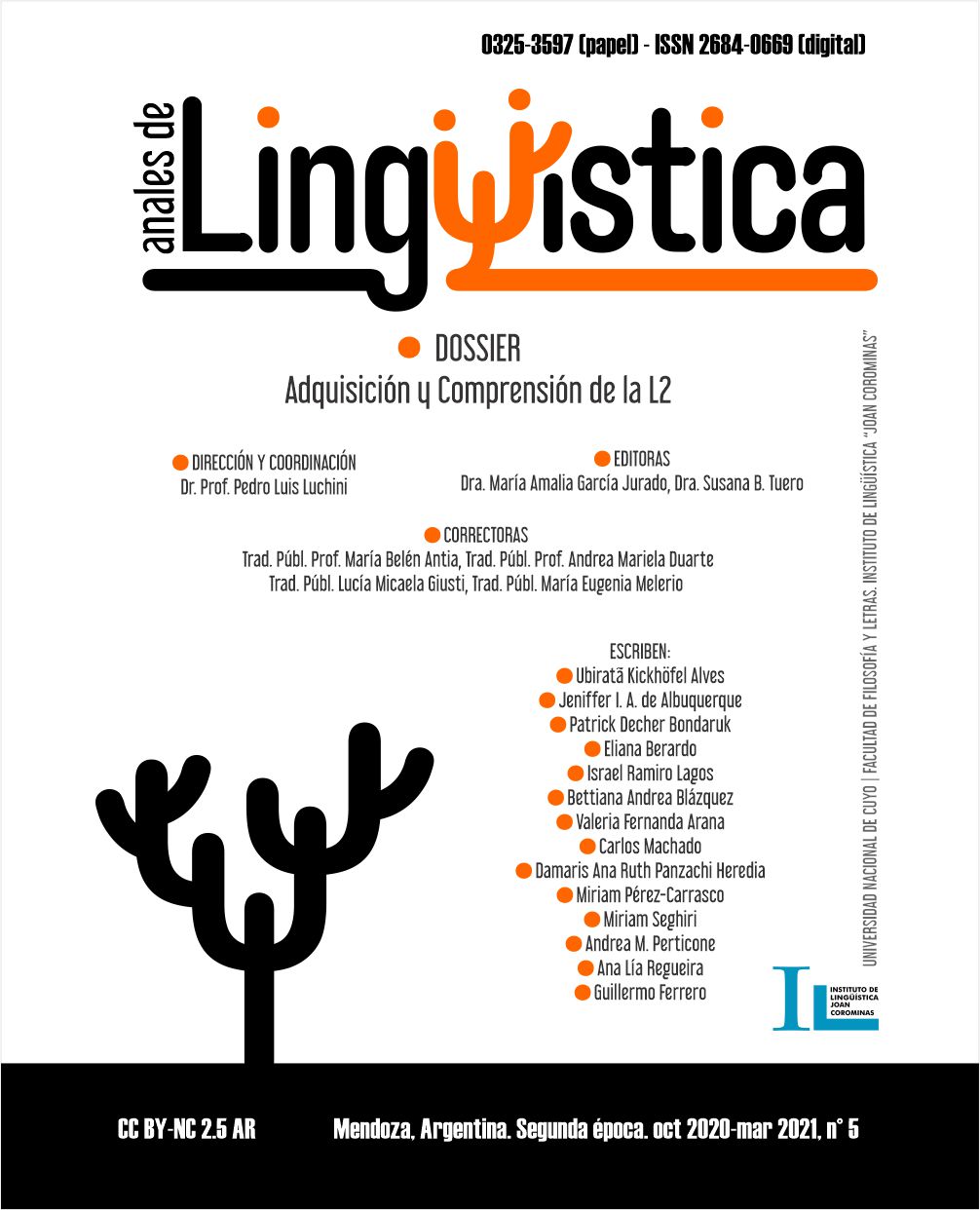Subjective perceptions of monotony and enthusiasm, and nuclear stress placement in a context of english as a foreign language
Keywords:
pronunciation, phonology, nuclear stress, intelligibilityAbstract
Previous studies in the field of English prosody highlight the role of nuclear stress as key to achieve an effective communication. This prosodic element creates cohesive ties in the communicational level, thus generating a certain tension between new and given information. The objective of this study is to determine the impact of nuclear stress placement on the subjective evaluations of an English speaker by their listeners. The participants in this experiment are students from the English Teacher Training Course of Studies at Universidad Nacional de Mar del Plata. Acting as evaluating raters of the speech samples, they were exposed to the same text, which was recorded in three different versions as regards nuclear stress placement. While version A follows the appropriate placement, version B violates the stress pattern by misplacing the nuclear stress. Additionally, version C violates the pattern as well, by a lack of nuclear stress. After listening to the three speech samples, the raters completed a scalar questionnaire and an open question individually. This paper addresses the results of those questions referred to speaker monotony and enthusiasm.
References
Luchini, P. L. y Kennedy, S. (2013). Exploring sources of phonological unintelligibility in spontaneous speech. The International Journal of English and Literature, 4 (3), pp. 79-88. https://doi.org/10.5897/IJEL12.049
McNerney, M. y Mendelsohn, D. (1992). Suprasegmentals in the pronunciation classroom: Setting priorities. En P. Avery y S. Ehrlich (Eds.), Teaching American English pronunciation (10.a ed., pp. 185-196). Oxford: Oxford University Press.
Morley, J. (1991). The pronunciation component in teaching English to speakers of other languages. TESOL Quarterly, 25 (3), pp. 481-520.
Munro, M. J. y Derwing, T. M. (1999). Foreign Accent, Comprehensibility, and Intelligibility in the Speech of Second Language Learners. Language Learning, 49 (1), pp. 285-310. https://doi.org/10.1111/0023-8333.49.s1.8
Panzachi Heredia, D. A. R. (2016). The impact of the incorrect placement of nuclear stress on non-native speakers’ difficulty to process oral discourse. En Zonas de contacto: Culturas, lenguas y educación. Actas IV Congreso Nacional "El conocimiento como espacio de encuentro" (pp. 152–162). Universidad Nacional del Comahue. Disponible en http://bibliotecadelenguas.uncoma.edu.ar/items/show/13
Panzachi Heredia, D. A. R. y Luchini, P. L. (2016). El protagonista de la prosodia inglesa: el acento tonal, y su rol decisivo en la comprensión auditiva. En IV Jornadas Internacionales de Didáctica de la Fonética de las Lenguas Extranjeras. Universidad Nacional de San Martín.
Pennington, M. C. y Richards, J. C. (1986). Pronunciation Revisited. TESOL Quarterly, 20 (2), pp. 207-225.
Perozzo, R. V. y Alves, U. K. (2014). Perception of English word-final unreleased consonants by Brazilian EFL learners. Concordia Working Papers in Applied Linguistics, 5, pp. 514-528.
Sperber, D. y Wilson, D. (1986). Relevance: Communication and cognition. Cambridge: Harvard University Press.
Szwedek, A. (1986). A linguistic analysis of sentence stress. Tubinegen: Gunter Narr Verlag.
University of Illinois. (2001). ICES item catalog. Disponible en https://citl.illinois.edu/docs/default-source/default-document-library/icescatalog.pdf?sfvrsn=2
Wichmann, A. (2015). Functions of intonation in Discourse. En M. Reed y J. M. Levis (Eds.), The handbook of English pronunciation (pp. 175-189). Chichester: Wiley Blackwell.
Downloads
Published
How to Cite
Issue
Section
License
Copyright (c) 2021 Anales de Lingüística
Esta obra está bajo una Licencia Creative Commons Atribución 2.5 Argentina.
Los/as autores/as que publican en esta revista están de acuerdo con los siguientes términos:
1. Los/as autores conservan los derechos de autor y garantizan a la revista el derecho de ser la primera publicación del trabajo bajo una licecncia Creative Commons Atribución 2.5 Argentina (CC BY 2.5 AR) . Por esto pueden compartir el trabajo con la referencia explícita de la publicación original en esta revista.
2. Anales de lingüística permite y anima a los autores a difundir la publicación realizada electrónicamente, a través de su enlace y/o de la versión postprint del archivo descargado de forma independiente.
3. Usted es libre de:
Compartir — copiar y redistribuir el material en cualquier medio o formato
Adaptar — remezclar, transformar y construir a partir del material para cualquier propósito, incluso comercialmente.












